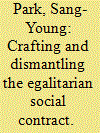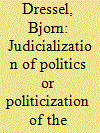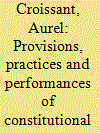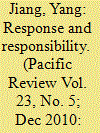|
|
|
Sort Order |
|
|
|
Items / Page
|
|
|
|
|
|
|
| Srl | Item |
| 1 |
ID:
100311


|
|
|
|
|
| Publication |
2010.
|
| Summary/Abstract |
Between the late 1960s and the early 1980s, the Korean developmental state implemented a series of drastic egalitarian educational policies that were primarily geared toward social integration. While promoting social mobility and educational expansion, they provided the basis of the egalitarian social contract in Korea's educational policymaking for decades. Since the 1990s, however, the Korean state has implemented neoliberal education reforms that led to the rapid dismantling of the egalitarian framework for the country's educational policymaking. These neoliberal reforms were strongly supported by the affluent middle class that prefer elitist education and can afford expensive private education. The general direction of change in Korea's educational policymaking suggests both significant change and continuity in the character of the Korean state and its relations to society since the 1990s. The contemporary Korean state still maintains a highly strategic and activist orientation in adopting and implementing policies although its policies are increasingly neoliberal in content. In doing so, the Korean state is gradually abandoning its broad social base and mobilizational capacity, while increasingly connecting with the upper segments of the middle class.
|
|
|
|
|
|
|
|
|
|
|
|
|
|
|
|
| 2 |
ID:
100315


|
|
|
|
|
| Publication |
2010.
|
| Summary/Abstract |
Courts are becoming major players in the political landscape of Southeast Asia. This paper seeks to examine the causes and consequences of this new trend with particular reference to Thailand. Our study primarily analyzes the behavior of the Thai Constitutional Court during the political crisis in 2006-2008; the findings suggest that recent judicial activism and assertiveness in political matters, while partly explained by the interests of judges themselves and by the constitutional rules guiding their activities, is best understood as a direct consequence of the intervention of the monarchy, to which the judiciary has traditionally been closely aligned. Accordingly, the Thai case not only provides new evidence about what may be driving the new judicialization trend, it also draws attention to problematic aspects of this trend, namely the gradual politicization of the Thai judiciary and with it the erosion of the rule of law in Thailand and its replacement with rule by law. Our findings may also illuminate some larger issues at the intersection of politics and the courts throughout the region in ways that advance the theoretical understanding of both.
|
|
|
|
|
|
|
|
|
|
|
|
|
|
|
|
| 3 |
ID:
100314


|
|
|
|
|
| Publication |
2010.
|
| Summary/Abstract |
During recent years, the role of information technology in shaping politics and social movements in the digital age is drawing increasing scholarly attention. There is, however, little such literature on North Korea as the country remains almost completely cut off from the Internet. Since the mid-1990s, the DPRK government has strategically developed its information and communication technology and has subsequently built a domestic intranet. Although North Korea keeps a minimal presence on the web, there are signs that the country is taking small and cautious steps to allow some social elites to take advantage of the Internet in order to leapfrog its economic development. Indeed, a high-profile defector indicated that North Korea will most likely start allowing wider but limited internet access in the near future. This paper examines North Korea's intranet and Internet policies and explores their political implications by drawing upon first-hand data from Korean sources and existing literature as well as by juxtaposing the North Korean case with other communist regimes such as China and Cuba in terms of their attempts to control and manipulate the Internet. It shows that the DPRK government is likely to learn from the Chinese and Cuban experiences and adopt a 'Mosquito-Net' model in controlling the Internet in an effort to attract foreign investment while keeping out information deemed threatening by the regime.
|
|
|
|
|
|
|
|
|
|
|
|
|
|
|
|
| 4 |
ID:
100313


|
|
|
|
|
| Publication |
2010.
|
| Summary/Abstract |
Via an analysis of the trans-ASEAN gas pipeline project (TAGP), in this article we argue for a reconceptualising of the regional dynamics of Southeast Asia and the forces shaping them. For this task, we propose an analytical framework based upon social conflict theory that delves within and beyond the state, and which places emphasis upon the roles of both material and ideological factors operating across time in the reordering of particular geographical spaces. The framework reveals that the tensions acting within and upon ASEAN and the TAGP influence regionalism in such a way that the gas pipeline project - much like other 'regional' projects - is unlikely to ever come close to fulfilling its brief of enhancing regional security and cohesion. What is more probable is that the project's form will continue to be conditioned by entrenched politico-economic realities and the influence of dominant ideologies - factors which have the capacity to exacerbate existing regional animosities and disparities.
|
|
|
|
|
|
|
|
|
|
|
|
|
|
|
|
| 5 |
ID:
100303


|
|
|
|
|
| Publication |
2010.
|
| Summary/Abstract |
This analysis of the institutional design and actual performance of constitutional review in five newly democratized nations in East Asia shows that during the last two decades the judiciary has come to play an increasingly important political role in South Korea, Taiwan and Indonesia. Constitutional courts in these three countries are more active in counterbalancing executive and legislative power than ever before. This however contrasts with the experiences of Thailand and Mongolia where constitutional courts were unable to fulfill a similar function. The discussion for potential explanations for this cross-national variance in court performance supports the critique in parts of the scholarly literature against purely institutional, cultural and structural explanations. Rather, the degree of political uncertainty and diffusion of political power are critical determinants for understanding why politicians comply with court judgments, or attempt to marginalize justices. In addition, the relationship between institutional support, compliance and the area of judicial review matters. In this regard, one lesson of the East Asian comparison is that a too early introduction of review of separation of power conflicts could actually make things worse, by threatening the court's authority and marginalizing its influence. This represents a danger often neglected in the democratization literature that claims judicial control of horizontal accountability mechanisms would necessarily help to consolidate democracy.
|
|
|
|
|
|
|
|
|
|
|
|
|
|
|
|
| 6 |
ID:
100312


|
|
|
|
|
| Publication |
2010.
|
| Summary/Abstract |
China's behaviour in East Asian financial cooperation has overall changed from passively responding to external pressures to taking proactive initiatives, which are highlighted by Chinese elites as evidence of a sense of responsibility. China has taken varied positions towards proposals for Asian financial regionalism, from 'silent' objection, to lukewarm or superficial support, to enthusiastic participation and substantial contribution, and this variance has not always taken place in a chronological order. Despite much speculation over the trajectory of China's role in East Asian regionalism, there has not been a study focused on China's policymaking towards East Asian financial cooperation. Therefore, this paper fills the gap by analysing the factors and policymaking processes that have led to those varied positions. It argues that China, recognising the momentum in the region to enhance cooperation, has replaced the blunt dismissals of proposals, particularly those from Japan, with a more subtle approach that is aimed at ensuring China's influence and promoting the image of a responsible great power; that the extent to which it can contribute to this process is mainly constrained by its economic conditions, particularly the financial institutions.
|
|
|
|
|
|
|
|
|
|
|
|
|
|
|
|
|
|
|
|
|